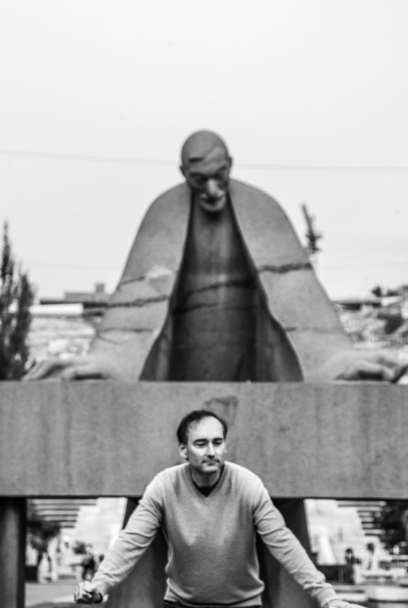
Acclaimed novelist Chris Bohjalian’s latest book, The Guest Room, will be released just in time for Christmas…specifically, Armenian Christmas.
“My non-Armenian friends are frustrated that the book won’t be ready for the December holidays,” he says, laughing, though the decision for the delay is understandable. “I decided in 2014 that I did not want to have a new book published in 2015—I didn’t want to be touring and talking about a new book on the Centennial of the Armenian Genocide,” Bohjalian explains.
The Guest Room—which tells the captivating story of a 19-year-old from Armenia who is abducted as a teenager, held captive as a sex slave in Russia, and brought to New York City to be exploited—was slated for publication in the summer of 2015, but Bohjalian felt it would be inappropriate for him to be on a book tour in 2015. “How can I be on a book tour, trying to sell books [in 2015]? Instead I was giving speeches about education, recognition, and justice,” he explains. Lucky for him, his publisher (Doubleday) was understanding and scheduled the release of the novel on the first “on-sale” day of 2016—Jan. 5.
Over the years, Bohjalian’s name has become synonymous with literary success and critical praise; he has published 18 books, including the New York Times best-sellers The Sandcastle Girls, Skeletons at the Feast, The Double Bind, and Midwives—the latter, a number one New York Times best-seller and a selection of Oprah’s Book Club. Bohjalian’s work has been translated into more than 30 languages, and three of his novels have been adapted into films.
His 2012 novel The Sandcastle Girls also appeared on the bestseller lists of Publishers’ Weekly, USA Today, and national independent bookstores.
Through the release and overwhelmingly positive international reception of The Sandcastle Girls, Bohjalian educated hundreds of thousands around the world about the plight of the Armenians in the crumbling Ottoman Empire, making it an invaluable and powerful piece.
Through his new book, The Guest Room, Bohjalian hopes to shed light on the horrors of human trafficking, and at the same time introduce readers to Armenia. “The Sandcastle Girls educated people who are not Armenian to one part of our history: the Armenian Genocide. I’m hoping The Guest Room is going to begin to show them other parts of our world,” he says.
Below is the entirety of the Armenian Weekly’s interview with Chris Bohjalian.
***
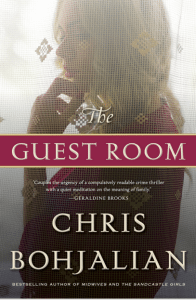
Rupen Janbazian—You’ve often written about social issues in the United States, such as transphobia, domestic violence, and substance abuse. And now, your latest book, The Guest Room, explores the dark world of sex-trafficking. How did you decide on this topic?
Chris Bohjalian—In some ways, the book had its origins in 2013. I was in Yerevan with my wife and daughter. We had also brought along a friend of my daughter’s, who had never been to Armenia. She was part Armenian and wanted to see the country. She was returning to the United States a day before the rest of us, so the plan was that I would take her to the airport for the 6 a.m. flight to Moscow. I asked her to meet me in the lobby of our hotel at about 3:30 in the morning. But because I’m a dad, I was downstairs about 10 minutes after 3—just in case she got there a little early. As I was waiting for her, I saw a young woman, who was probably my daughter’s and her friend’s age, or even younger, and she was clearly an escort, paying off the bellman to go upstairs and do her work.
As a father, that kind of thing just breaks your heart. And I began to wonder if there was a novel in this young woman and her story. The reality is that when you research prostitution in the Caucasus and the Middle East, you’re only a razor-thin line away from suddenly researching human trafficking. And before I knew it, I was off and running with this novel about a courageous, brave, beautiful, amazing Armenian girl, who is trafficked through Moscow to America.
R.J.—The issue of sex-trafficking is not often discussed. Why do you think this is?
C.B.—Whether it’s human trafficking or sexual trafficking, it is so appalling to us and our sensibility in the 21st century that it’s almost taboo— we still want to avert out eyes. I think that’s certainly a big reason. We don’t like to envision that this is happening to anyone, especially not women, young girls, and of course boys. There are two writers who have touched on it in our [Armenian] community. There’s Desert Nights [by Edik Baghdasaryan and Ara K. Manoogian] and Vahan Zanoyan’s books A Place Far Away and The Doves of Ohanavank. Vahan has been a spectacular advocate for our young women in Hayastan, and Edik and Ara’s book chronicles the problem in places like Dubai and Istanbul.
The numbers vary, but they’re always alarming. The international Labor Organization estimates that 4.5 million people are victims of forced sexual exploitation around the world, and the National Center for Missing & Exploited Children estimates that 1 in 6 endangered runaways in the United States are sex-trafficking victims.
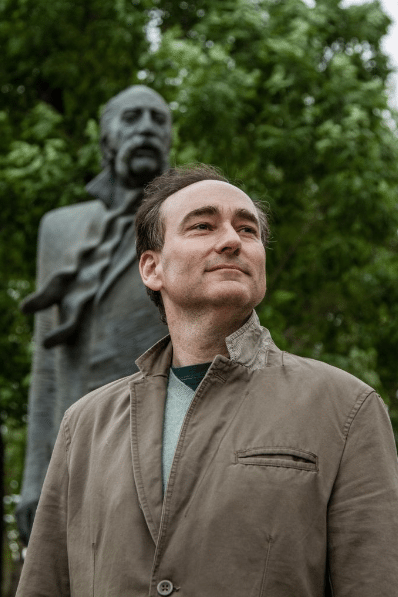
R.J.—What sort of research went into the book? Were you able to speak to survivors?
C.B.—For purposes of researching for the book, I spent some time with therapists, social workers, and people who work with survivors. I’ve spoken to people whose stories are not as egregious or as horrific as what the girls in my book endured, but certainly were very close to being dropped in that cataclysmic rabbit hole of human trafficking and international contraband.
R.J.—Were you able to research the issue in the United States at all?
C.B.—It’s important to note that most sex slaves in the United States are domestic. Given the elasticity—the price elasticity of sex, which is a horrible way of putting it, the way economists study and view it—it’s almost too expensive to bother bringing girls from overseas to the United States, when you can get girls here without having to take the risks or pay the cost. I don’t remember the exact number, but it’s small. Somewhere in the neighborhood of three percent of sex slaves in the United States, or the young women or boys who are put into forced sexual exploitation, are illegal aliens. Most are domestic.
R.J.—It can be emotionally taxing to tackle an issue that has so much violence, abuse, and trauma associated with it. Could you talk about the writing process and how you were affected by it?
C.B.—There are a couple of issues that were important for me as a novelist while I was writing this book. First of all, I did not want the sex to be erotic or gratuitous; I really wanted it to be clear that this behavior is about violence, degradation, and enslavement. A little violence does go a long way, and I wanted to make sure that my readers would keep turning the pages. So I often had my 2007 novel The Double Bind in mind.
The Double Bind is about a book that revolves around a Vermont social worker who is sexually assaulted. It’s also about other things like homelessness and photography, and I think that was important—readers stayed with it, because there was a respite from the violence. So I think that The Guest Room is about a lot of other things as well; it’s about a marriage in crisis, it’s about one man’s fall from grace, it’s about what it means to be a parent. I wanted to make sure that there were characters my readers could identify with and care about.
There’s never any question in my mind that readers are going to care about Anahit—Alexandra, as she was renamed by the traffickers in Moscow—but I wanted to make sure that the Americans in the book are also sufficiently empathetic, that you care about them too, that you care about their back stories. So that means that some of the men at the bachelor party—and there are some horrible men at that bachelor party, make no mistake—are morally complex; that Richard—the man hosting the party—and his wife Kristin are morally complex; and that their nine-year-old daughter Melissa has a rich internal life, and that you care about her too.
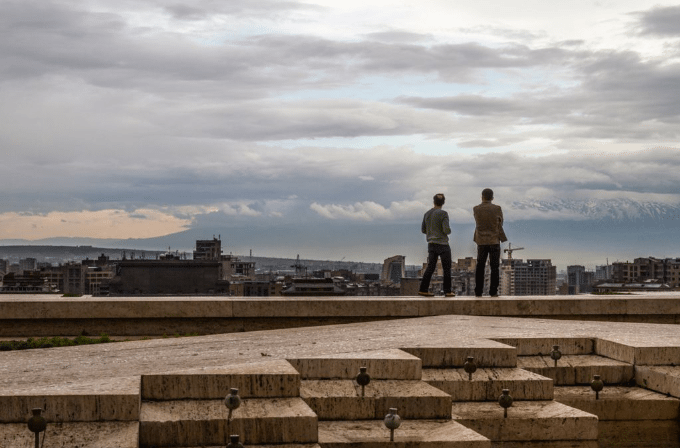
R.J.—What do you hope to convey to readers about the issue of sex-trafficking?
C.B.—It’s important to note that I’m a novelist, that I’m a storyteller. What I want more than anything from The Guest Room is for readers to feel what a riveting page-turner it is. I want them to be moved by the plight of the characters—all of them. And there are parts of the book that are heartbreaking—I hope that they are heartbreaking in a way that we’ve been emotionally moved and satisfied.
This isn’t a treatise on sex-trafficking. This isn’t a treatise on human trafficking. This isn’t a book that is going to teach anyone anything about human trafficking or sexual slavery that they didn’t already suspect. It’s terrible, it’s degrading, it’s violent, it’s horrific, it’s one of the most egregious human right violations imaginable, but it’s not as if this is a book about statistics or survivor stories. It’s a novel about an investment banker in New York City, his wife who is a school teacher, their nine-year-old daughter, and two girls who are at a bachelor party, who turn out to be sex slaves.
R.J.—Why did you decide to have an Armenian character in the story?
C.B.—In some ways, The Guest Room is a bookend to The Sandcastle Girls. In The Sandcastle Girls, I was trying to give voice to all of our ancestors, who were systematically annihilated in 1915 and 1916. The Guest Room, in some ways, is a way for me to give voice to some absolutely remarkable young adults and children in Hayastan in 2015 and 2016. In reality, all of us in the diaspora have a moral obligation to be there for that country. I mean, it’s a country that is trying to build democracy in a post-Soviet world; it’s trying to go to a free-market economy while surrounded by closed borders and nations that wished it did not exist; it’s trying to rise up from a cataclysmic natural disaster in 1988; and now, of course, we are dealing with our communities that are absolutely under siege in Syria. So The Guest Room is very important for me in that regard.
I hope readers in Indianapolis, in Jacksonville, Fla., in Vancouver, and Miami, who know nothing about Armenians, will see the section set in Yerevan—a spectacularly beautiful city—because there are whole chapters set in there. I hope that they will Google Gyumri after reading a lengthy chapter about what Alexandra’s parents endured as newlyweds years earlier in the Gyumri earthquake.
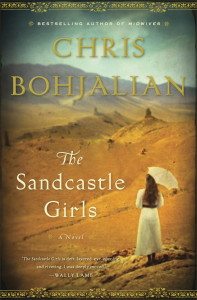
R.J.—At certain points in the book, Alexandra speaks about the Armenian Genocide and the 1988 earthquake. Why did you feel it was important for her to reflect on these issues?
C.B.—The Sandcastle Girls educated people who are not Armenian to one part of our history: the Armenian Genocide. I’m hoping The Guest Room is going to begin to show them other parts of our world. Armenia is a remarkable country, Yerevan is a beautiful city. Yes, the book is about human trafficking; yes, it is a literary thriller. It’s not a travel guide, make no mistake—probably three quarters of the book is set in Westchester County and New York City.
But I found in my writing that a little good goes a long way and causes people to go deeper into the subject matter. In 2002, I wrote a novel called The Buffalo Soldier, which is about an African-American foster child in the present, in rural, white Vermont. But there are a lot of references scattered throughout to the Ninth and Tenth Cavalries—the African-American cavalries in the Indian and Spanish American Wars. And even now, 13 years later, 2 or 3 days don’t go by without hearing from readers, who write me about that book and how it elevated their interest in the Cavalries and how they wanted to learn more. Certainly, that’s the case with a book like Midwives and homebirth; or Tran-Sister Radio and the transgendered; Skeletons at the Feast and what it was like to be a Prussian in World War II; and The Sandcastle Girls and the Armenian Genocide. I will be thrilled if a year from now, I’m hearing from people who want to know more about the Cafestjian [Center for the Arts], or want to go see Victoria Ananyan—the Velvet Bird—dance.
***
The Guest Room can be pre-ordered on Amazon.
Bohjalian will conduct the first leg of his book tour for The Guest Room, Jan. 4-22, 2016.



great interview and well explained by the writer. I wish him a wonderful future with the reality of our heritage in mind. May your books open the eyes of those who are unaware of this wonderful country of our’s ARMENIA and it’s past and present history and it’s survival.
Very thorough and informative interview. Enjoyed reading the article. Chris Bohjalian is undoubtedly a talented author and Hovnanian School is delighted to host him this January 15, 2015 for a special evening with the author.